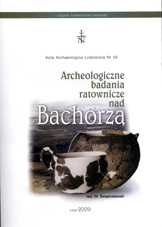Historia i archeologia w pierwszych latach po II wojnie światowej
History and archeology in the first years after World War II
Author(s): Rafał StobieckiSubject(s): Archaeology
Published by: Łódzkie Towarzystwo Naukowe
Summary/Abstract: The situation of two disciplines of my humanistic interest - history and archaeology in 1945 literally and figuratively resembled “the landscape after a battle”. Grounds, choices and behaviour of the scientists, risking some simplification, were determined by two factors. The first was connected with a natural need that inclined the researchers to restoration destroyed by the war workshops, archival and archaeological collections and scientific institutions. It was a deeply reasonable psychological reaction to traumatic war experiences, connected with the intention of return to widelyunderstood “normality”. The other, extremely important factor was incipient new social-political order determined by decisions concerning Polish matters undertook on conferences in Yalta and Potsdam. They meant essential changes in territorial shape of the state, its nationalistic structure and announced deep structural changes. Therefore, it was not a chance that circles of prehistorians and historians tried in such circumstances to recover their place in new reality and meet its challenges in different ways. Looking from today`s perspective it may be said that the realities of those days quite precisely determined both possible field of compromise between the authorities and representatives of both disciplines as well as the arena of, to some extent, unavoidable conflict. What was of essential significance was a question – whether Polish historiography and archaeology, reviving after the years of war and occupation may continue, even with certain far-reaching changes, traditions of both disciplines from the interwar period or whether they should entirely reject those patterns from the years 1918-1939 and begin wide-scale reconstruction of its organizational structures, methodological grounds, interpretation canons? As we know, finally an idea of rejection of the interwar tradition and building foundations of new “socialistic science” triumphed. The title, first post-war years of historiography and archaeology are difficult to be univocally estimated. Surely, it was the time of radical transformations of both disciplines – organizational, theoretical-workshop ones, sometimes basic changes in look into the past both the distant and the nearest ones. The marked modernization tendency appeared to be however unstable. At the end of the 1940s the period of discussions and polemics was gradually finishing, the epoch of Stalinism, of forcing Russian institutional and methodological patterns was coming. It was just this experience that became a constant element of Polish scientific life in the following years.
Journal: Acta Archaeologica Lodziensia
- Issue Year: 2007
- Issue No: 53
- Page Range: 106-112
- Page Count: 7
- Language: Polish

